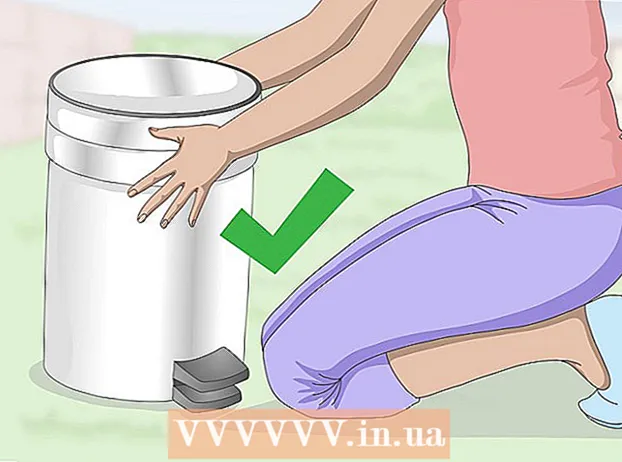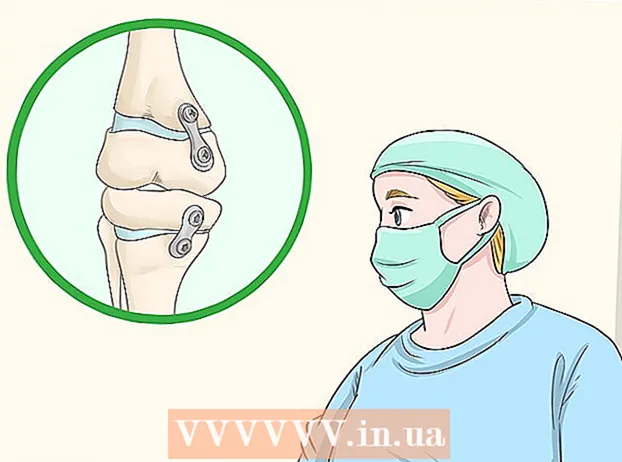
Content
- Steps
- Method 1 of 4: Calming Down Quickly
- Method 2 of 4: Dealing with Anxiety
- Method 3 of 4: Help from a specialist
- Method 4 of 4: How to recognize a panic attack
- Tips
- Warnings
All people experience anxiety from time to time, but a true panic attack can scare and make a person even more worried. With a couple of simple tricks, you can help yourself calm down during a panic attack and gain control over your body. As soon as you feel an anxiety attack approaching, try to get yourself back to the present moment and start breathing deeply. To prevent recurrence of attacks, work with the underlying causes. If you find it difficult to cope with these attacks on your own, see a therapist or psychotherapist.
Steps
Method 1 of 4: Calming Down Quickly
 1 Do a special exercise to return to reality and distract yourself. Try to distract your attention from your anxiety and focus on your surroundings. As soon as you feel the approach of an anxiety attack, stop and focus on your sensations: on what you feel, see, hear, as well as on smells and tastes.
1 Do a special exercise to return to reality and distract yourself. Try to distract your attention from your anxiety and focus on your surroundings. As soon as you feel the approach of an anxiety attack, stop and focus on your sensations: on what you feel, see, hear, as well as on smells and tastes. - Take a small object (a bunch of keys, an anti-stress ball) in your hand and touch it from different sides. Pay attention to its weight and surface texture.
- If you have a cold drink on hand, sip it slowly. Pay attention to how the glass feels in your hand and how you feel when the drink enters your mouth.
- You may also find it helpful to remind yourself of who you are and what you are doing here and now. For example, say to yourself, "I'm Christina, I'm 22 years old, I'm sitting in my room. I just got home from work."
 2 Breathe deeplyto calm down. If you have a panic attack, you are probably hyperventilating. Even if not, it's important to breathe deeply to relieve stress and improve oxygen flow to the brain. This will give you the opportunity to focus. When a panic attack is approaching, stop and try to slow down your breathing. Breathe in slowly and regularly through your nose and out through your mouth.
2 Breathe deeplyto calm down. If you have a panic attack, you are probably hyperventilating. Even if not, it's important to breathe deeply to relieve stress and improve oxygen flow to the brain. This will give you the opportunity to focus. When a panic attack is approaching, stop and try to slow down your breathing. Breathe in slowly and regularly through your nose and out through your mouth. - If possible, sit up straight or lie down with one hand on your stomach and the other on your chest. Feel the belly expand as you inhale slowly. Then use your abdominal muscles to push the air out.
- Try to count to five each time you inhale and exhale.
 3 Focus on your thoughts and feelings. During a panic attack, your thoughts can get confused. You probably feel too much of everything at once, which makes you feel overwhelmed. Think about what's really going on in your body and in your head. This will allow you to deal with your feelings. Sit quietly and try to mentally describe your feelings and thoughts without evaluating them.
3 Focus on your thoughts and feelings. During a panic attack, your thoughts can get confused. You probably feel too much of everything at once, which makes you feel overwhelmed. Think about what's really going on in your body and in your head. This will allow you to deal with your feelings. Sit quietly and try to mentally describe your feelings and thoughts without evaluating them. - For example: "My heart is beating very fast. My hands are sweating. I am afraid I will pass out."
- Remind yourself that all of these symptoms are due to anxiety. Do not force yourself to control these symptoms - this can only increase the panic. Tell yourself that these symptoms are temporary and will go away soon.
Advice: Stay where you can and think about how you are feeling. Over time, this will help your brain realize that the situation is not dangerous. Trying to escape from this situation can strengthen the connection in the brain between the situation and the panic.
 4 Master the tricks progressive muscle relaxation. As part of this practice, you need to consistently strain and relax each muscle group. This allows you to achieve two goals: focus on something else and relax all your muscles. Start with the muscles of the face, then work your way down until you have worked all the muscles.
4 Master the tricks progressive muscle relaxation. As part of this practice, you need to consistently strain and relax each muscle group. This allows you to achieve two goals: focus on something else and relax all your muscles. Start with the muscles of the face, then work your way down until you have worked all the muscles. - Tighten each muscle group for 5-10 seconds and then relax it. You can repeat the exercise on the same muscle group several times, but once will be enough.
- It is important to tighten and relax the following parts of the body: jaw, mouth (frowning to normal), arms, palms, stomach, buttocks, thighs, calves, feet.
Method 2 of 4: Dealing with Anxiety
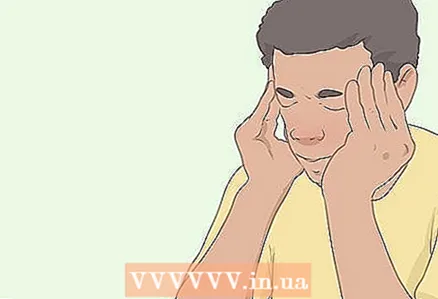 1 Acknowledge that you are experiencing anxiety. While you may be looking to ease your anxiety symptoms, don't try to ignore it. Ignoring and suppressing emotions can intensify them and make them more intimidating. Accept that you are scared and that there is nothing wrong or bad about it.
1 Acknowledge that you are experiencing anxiety. While you may be looking to ease your anxiety symptoms, don't try to ignore it. Ignoring and suppressing emotions can intensify them and make them more intimidating. Accept that you are scared and that there is nothing wrong or bad about it. - Try writing down your feelings or discussing anxiety with a friend.
 2 Try to challenge unrealistic thoughts and replace them with others. It is important to stop the process of forming anxious thoughts and replace them with thoughts that will help you feel calm and joyful. This will give you the opportunity to stop repeating the same thing and break out of the vicious circle.Ask yourself a few questions. Is what you fear a real danger? Remind yourself that you are afraid, but you are not in danger. It is important to eliminate danger from the situation in order to relax.
2 Try to challenge unrealistic thoughts and replace them with others. It is important to stop the process of forming anxious thoughts and replace them with thoughts that will help you feel calm and joyful. This will give you the opportunity to stop repeating the same thing and break out of the vicious circle.Ask yourself a few questions. Is what you fear a real danger? Remind yourself that you are afraid, but you are not in danger. It is important to eliminate danger from the situation in order to relax. - For example, you are worried about an upcoming flight and cannot stop thinking about what might happen. Say stop to yourself mentally or aloud. Then replace the anxious thoughts with calm and positive thoughts - for example, thoughts about a vacation with your best friends and how happy you are with the connection.
- Replace the thought with a more realistic one: "It is unlikely that the plane will crash. Air travel is one of the safest ways to get around."
- You may have to repeat this exercise many times for it to work, so be patient and don't push yourself.
Important to remember: This technique will not work during a panic attack, as the attack may not have any connection with any clear thought or cause. However, this technique can be useful in dealing with general anxiety.
 3 Use imagery and visualization techniques to relax. Imaging can help you relax and reduce anxiety. Imagine a place where you feel comfortable. It could be your home, your favorite vacation spot, the hug of your loved one. When imagining a place, add different sensations to the picture so that your whole mind is focused on creating that image. Think about what you see, hear what you touch, what smells and tastes surround you.
3 Use imagery and visualization techniques to relax. Imaging can help you relax and reduce anxiety. Imagine a place where you feel comfortable. It could be your home, your favorite vacation spot, the hug of your loved one. When imagining a place, add different sensations to the picture so that your whole mind is focused on creating that image. Think about what you see, hear what you touch, what smells and tastes surround you. - You can do this with your eyes open or closed, although it will be easier with your eyes closed.
- When anxiety attacks approach, visualize your safe place. Imagine that you are calm and relaxed in a place that you know well. Finish the visualization when you feel calmer.
 4 Write down your feelings so that it is easier to deal with them. If you have panic attacks or anxiety attacks, keep a journal and write about your feelings in it. Write down how you feel, what you are afraid of, what you think about this fear and what it seems to you, and note the intensity of all feelings. This will make it easier for you to focus on your thoughts. As you reread the notes, you will analyze your feelings, which will allow you to keep your anxiety under control.
4 Write down your feelings so that it is easier to deal with them. If you have panic attacks or anxiety attacks, keep a journal and write about your feelings in it. Write down how you feel, what you are afraid of, what you think about this fear and what it seems to you, and note the intensity of all feelings. This will make it easier for you to focus on your thoughts. As you reread the notes, you will analyze your feelings, which will allow you to keep your anxiety under control. - At first, you may feel like you have nothing to say. Continue to analyze situations that trigger anxiety. As you learn to slow down and analyze situations in detail, you can highlight thoughts and feelings that might be causing anxiety.
- Be understanding with yourself when you take notes. Don't judge yourself or your thoughts. Remember: you cannot control the appearance of your thoughts and feelings, and no thoughts or feelings are only bad or only good. However, you can control how you react to these thoughts and feelings.
 5 Pay attention to your body to always feel good. Paying attention to your physical health will help improve your mental health. Exercise and proper nutrition will not cure your anxiety, but they will help you fight it. To improve your physical health and emotional well-being, do the following:
5 Pay attention to your body to always feel good. Paying attention to your physical health will help improve your mental health. Exercise and proper nutrition will not cure your anxiety, but they will help you fight it. To improve your physical health and emotional well-being, do the following: - Go in for sports. Exercise, especially aerobic exercise, promotes the production of endorphins, which improve mood and help a person feel calmer.
- Eat right. There is no product that will completely cure or prevent the development of anxiety. However, avoiding processed foods and foods high in sugar can be beneficial, as can eating lean protein, complex carbohydrates (such as whole grains), and fresh fruits and vegetables.
- Don't use stimulants. Substances such as caffeine and nicotine can cause anxiety and tension, and they can exacerbate existing anxiety. Some people mistakenly believe that smoking can calm you down, but this is not the case.Nicotine addiction increases stress and anxiety when the level of this substance in the body decreases. In addition, smoking is extremely unhealthy.
 6 Act so as not to get stuck in your thoughts. Experiencing anxiety will only aggravate the condition, and it will become more difficult for you to deal with panic. Distract your mind and your body with some task: cleaning, painting, talking to a friend. It is best to do what you do as a hobby and what you enjoy.
6 Act so as not to get stuck in your thoughts. Experiencing anxiety will only aggravate the condition, and it will become more difficult for you to deal with panic. Distract your mind and your body with some task: cleaning, painting, talking to a friend. It is best to do what you do as a hobby and what you enjoy. - Take a warm bath or shower. Scientists have found that the sensation of warmth can calm and relax many people. Add a couple drops of lemon balm or bergamot, jasmine, or lavender essential oil to the water. These essential oils have a relaxing effect.
- If you know exactly what is causing the anxiety, do something that will allow you to get rid of the source of the problem. For example, if you are worried about an upcoming test, reread your notes. This will make you feel more confident.
 7 Try relaxing with music therapy. Make a list of soothing compositions that lift your mood. If or when you feel anxiety approaching, play this music to relax. Use noise canceling headphones whenever possible to focus on the music. Concentrate on different parts, sounds, lyrics, if any. This will help you take your mind off your fear.
7 Try relaxing with music therapy. Make a list of soothing compositions that lift your mood. If or when you feel anxiety approaching, play this music to relax. Use noise canceling headphones whenever possible to focus on the music. Concentrate on different parts, sounds, lyrics, if any. This will help you take your mind off your fear. - It is best to listen to slow music (60 or less beats per minute) with calm lyrics (or no lyrics). Fast music and aggressive lyrics can increase stress.
 8 Ask a friend for help. If you're having trouble getting out of your anxiety state, call a friend or family member and ask for help. Let this person distract you from your panic and analyze your fear so that it is easier for you to overcome it. If you have frequent panic attacks, teach your friend how to deal with the attack so that the person is prepared for the fact that you may ask for help.
8 Ask a friend for help. If you're having trouble getting out of your anxiety state, call a friend or family member and ask for help. Let this person distract you from your panic and analyze your fear so that it is easier for you to overcome it. If you have frequent panic attacks, teach your friend how to deal with the attack so that the person is prepared for the fact that you may ask for help. - For example, ask the person to hold your hand during a panic attack and remind you that you are not in danger.
Method 3 of 4: Help from a specialist
 1 See a psychotherapist if anxiety is very strong or persists for a long time. If panic attacks persist for a long time, make an appointment with a psychotherapist. You may have panic disorder or general anxiety disorder. These disorders should be treated by a specialist.
1 See a psychotherapist if anxiety is very strong or persists for a long time. If panic attacks persist for a long time, make an appointment with a psychotherapist. You may have panic disorder or general anxiety disorder. These disorders should be treated by a specialist. - Cognitive behavioral therapy is the most commonly used treatment for anxiety disorders. It teaches a person how to recognize and change harmful thoughts and habits.
- In some cases, drugs to suppress anxiety may be indicated (if other treatments have not been effective enough). Medications are most effective when combined with psychotherapy and lifestyle changes.
 2 Ask a therapist to refer you to a psychotherapist. In some countries, it can be difficult to find a good therapist, especially if the person has a low income or insurance does not cover the full range of medical services. If you have severe anxiety and are unable to see a therapist quickly, talk to your therapist.
2 Ask a therapist to refer you to a psychotherapist. In some countries, it can be difficult to find a good therapist, especially if the person has a low income or insurance does not cover the full range of medical services. If you have severe anxiety and are unable to see a therapist quickly, talk to your therapist. - Although physicians cannot usually provide psychotherapy (except for psychiatrists), they can identify many disorders, including depression and anxiety, and prescribe medications. The doctor can also recommend vitamins and supplements, and advice on lifestyle changes.
- If you are unsure whether your symptoms indicate anxiety or not, ask your doctor to examine you and make a conclusion.
- The therapist can also refer you to a specialist.
 3 Look for opportunities to see a therapist for free or for a small fee. If you can't afford to pay for psychotherapy, look for free or low-cost options.
3 Look for opportunities to see a therapist for free or for a small fee. If you can't afford to pay for psychotherapy, look for free or low-cost options. - Contact a psychotherapy clinic.
- If you live in Moscow, call the single reference telephone number of the Moscow Service for Psychological Assistance to the Population +7 (499) 173-09-09 and make an appointment with a specialist. You can also leave a request on the website of the Moscow Service for Psychological Aid to the Population and get an online consultation.
- Free help is also provided by some public organizations (the Sisters Independent Charitable Center for Assisting Sexual Abuse Survivors, the Anna Regional Public Organization and others) and educational institutions (the Moscow City University of Psychology and Education, the Center for Psychological Counseling at the Higher School of Economics, and others).
Method 4 of 4: How to recognize a panic attack
 1 Analyze your physical symptoms. Panic attacks can happen to anyone, but they are most commonly seen in people with panic disorder, an anxiety disorder that is characterized by frequent bouts of fear and anxiety. Almost any situation can trigger a reaction, not just a dangerous one. The physical symptoms of a panic attack include the following:
1 Analyze your physical symptoms. Panic attacks can happen to anyone, but they are most commonly seen in people with panic disorder, an anxiety disorder that is characterized by frequent bouts of fear and anxiety. Almost any situation can trigger a reaction, not just a dangerous one. The physical symptoms of a panic attack include the following: - Chest pain. It is usually localized in one part of the chest, rather than spreading to the left side of the body as in a heart attack.
- Dizziness and loss of consciousness
- Choking, unable to take a deep breath
- Nausea or vomiting; with panic attacks, vomiting is less likely
- Heart palpitations
- Dyspnea
- Increased sweating, clammy skin, hot flashes
- Shiver
- If you have a severe panic attack, your arms or legs may cramp or even paralyze you for a while. This symptom is due to hyperventilation of the lungs.
A warning: Many of the symptoms of a panic attack are difficult to distinguish from those of a heart attack. If you experience chest pain, severe dizziness and weakness, numbness in your arms and have not had panic attacks before, call an ambulance or go to the emergency room of the hospital. The doctors will assess your condition and decide if there is any cause for concern.
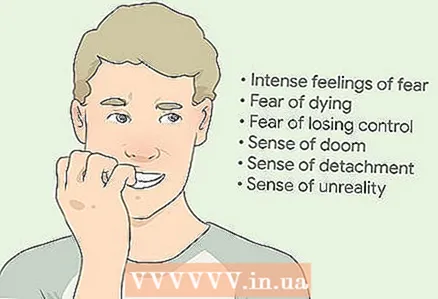 2 Pay attention to feelings of intense fear or dread. In addition to the physical symptoms, panic attacks have psychological or emotional symptoms. These include:
2 Pay attention to feelings of intense fear or dread. In addition to the physical symptoms, panic attacks have psychological or emotional symptoms. These include: - Intense fear
- Fear of death
- Fear of losing control
- Feeling of rock
- Feeling disconnected from reality
- Feeling the unreality of everything that happens
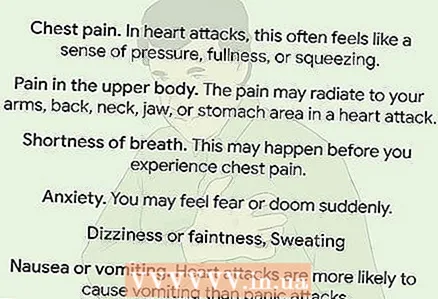 3 Know the signs of a heart attack. Some of the symptoms of panic attack and heart attack are the same. If you even Little in doubt whether you have a panic attack or a heart attack, call an ambulance. Symptoms of a heart attack include the following:
3 Know the signs of a heart attack. Some of the symptoms of panic attack and heart attack are the same. If you even Little in doubt whether you have a panic attack or a heart attack, call an ambulance. Symptoms of a heart attack include the following: - Chest pain. With a heart attack, chest pain is felt as squeezing, constriction, fullness of the chest. Pain usually lasts longer than a couple of minutes.
- Pain in the upper body. Pain can radiate to the arms, back, neck, jaw, or abdomen.
- Dyspnea. It can come before chest pain.
- Anxiety. You may suddenly feel fear or something terrible is approaching.
- Dizziness, loss of consciousness
- Increased sweating
- Nausea or vomiting In heart attacks, vomiting is more common compared to panic attacks.
 4 Learn to distinguish between common anxiety and panic disorder. All people experience stress from time to time or even experience severe anxiety. However, for most people, anxiety is the result of some exciting event (such as an exam or an important decision). The anxiety usually goes away when the situation is resolved. But people with anxiety disorders experience anxiety more often, sometimes even regularly. In panic disorder, a person often has severe panic attacks.
4 Learn to distinguish between common anxiety and panic disorder. All people experience stress from time to time or even experience severe anxiety. However, for most people, anxiety is the result of some exciting event (such as an exam or an important decision). The anxiety usually goes away when the situation is resolved. But people with anxiety disorders experience anxiety more often, sometimes even regularly. In panic disorder, a person often has severe panic attacks. - A panic attack usually peaks within 10 minutes, although some symptoms may last longer. Feelings of general stress and anxiety can last for a long time, but they will not be as intense.
- A panic attack can occur for no reason. Sometimes it seems that it comes suddenly and inexplicably.
Tips
- Chamomile helps you relax and calm down. However, some people have an allergic reaction to chamomile. Plus, this herb can interact with drugs, so check with your doctor before taking it.
- Exercise regularly and learn relaxation techniques. They help fight stress and improve sleep quality. Sleep is extremely important for people with anxiety, and you should not deliberately restrict sleep.
- Remember that your friends and family are always there, that they love you, think of you and are ready to support you. Don't be afraid to tell them about your problems, even if you're embarrassed.
- Aromatherapy can be very helpful, especially during a panic attack. White noise can be soothing, too, even if you're just nervous.
- During panic attacks, you can try using self-awareness techniques or fiddling with a rosary. This will allow you to stay in the moment and redirect your thoughts to something calming.
Warnings
- If panic attacks recur frequently, seek help from a psychotherapist as early as possible. Delaying treatment will only make the problem worse.
- If you are unsure if you have a panic attack or a heart attack, call an ambulance right away.
